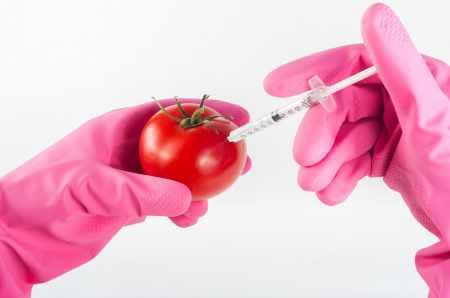February 26, 2024
In the Lab and On the Plate: Considering GMO Perspectives!
One big concern parents have when it comes to taking care of their kids is what type of food we should feed them to ensure our kids grow up strong and healthy! But as we know, it is not as easy as it seems with these confusing labels and expensive prices. So today, we will talk to you about nutritious foods and the concerns of GMOs!

What are GMOs?
GMO stands for genetically modified organisms. Countries around the world use GMOs to improve their crops, such as by making them last longer and resisting certain pests. GMOs are also used to improve the hardiness and number of seeds so that we can have more food! Despite all of these benefits, there have been concerns about the safety of these GMO foods and how they will affect their kids.
The Growing Concerns Over GMOs
In the United States, these are the only GMO crops that are allowed in the United States:
- Alfalfa
- Apples
- Canola
- Corn
- Cottonseed
- Papaya
- Potatoes
- Soybeans
- Yellow squash and zucchini
- Sugar beets
Why does this matter? Well, a lot of the stuff we eat that’s processed, like certain snacks or cereals, often contains ingredients made from GMO corn and soybeans. These ingredients might be in things like cornstarch, oils made from soybeans, or a sweetener called high-fructose corn syrup. It is also in many infant formulas!
The thing about GMO crops is that they make it easier for farmers to control weeds and pests. The problem arises when some crops are resistant to the herbicides. Farmers then use different herbicides, like glyphosate, on these GMO crops to kill the weeds without harming the crops, but potentially harming human beings. When the crops are ready, there are still small amounts of these herbicides, called “residues,” left in the grains. These residues have been found more often in foods that kids eat and even in drinking water lately. This is dangerous. Glyphosate, a chemical used in herbicides like Roundup, is toxic and carcinogenic to children, which means it can cause cancer. Whatever is in any food is concentrated in the growing young, whether it is a child or a chicken.
Scientists have also found that when moms are exposed to glyphosate while they’re pregnant, it might increase the chances of their babies being born too early. It may potentially disrupt a child’s hormonal balance even before birth. Understanding exactly how glyphosate leftovers affect a child’s health is still tricky and not fully figured out yet.
Recommendations
Navigating the GMO world can be confusing. Here are some recommendations below:
- It is helpful to understand the differences between organic, non-GMO, and bioengineered labeling. Organic foods and bioengineered foods are labeled by the USDA. Only organic foods are guaranteed as non-GMO. Non-GMO labeling is optional and usually managed by other groups. Food with a non-GMO label doesn’t mean the same thing as food without a label that may still contain GMOs.
- Families who want to avoid GMOs can focus on eating mostly whole, plant-based foods and avoiding highly processed ones. Most foods that aren’t highly processed don’t have GMOs. Families can choose either based on their preferences and what’s available to them.
- If families want to avoid all GMOs, they can buy organic or non-GMO-labeled products verified by third-party testing.
- Every family has to decide whether to avoid GMO foods. Doctors can help without scaring them. It’s important for doctors to understand your family’s situation while promoting healthy, affordable foods that aren’t bioengineered. Some non-GMO foods, especially organic ones, can be pricier, which might limit choices for many families.
- One way to get more affordable organic foods is to shop at the farmer’s market. If you are an EBT holder, several farmer’s markets are a part of the Market Match program where you can get extra money to shop for fresh produce and groceries! Check out Market Match here for more information.
- You might need to advocate for your child at their school to serve organic and/or non-GMO foods when possible and affordable to reduce exposure to glyphosate and other toxins.
